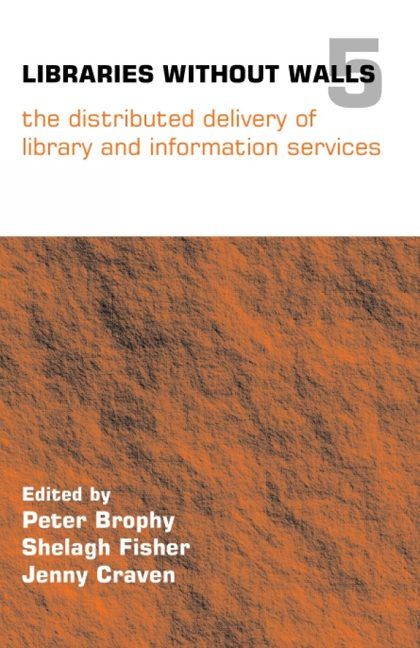Book contents
- Frontmatter
- Contents
- Contributors
- 1 Introduction
- 2 Keynote paper: beyond the mainstream of library services
- THEME 1 THE INTEGRATION OF LIBRARY SERVICES AND VIRTUAL LEARNING ENVIRONMENTS
- THEME 2 THE RELATIONSHIP BETWEEN USER NEEDS, INFORMATION SKILLS AND INFORMATION LITERACIES
- 8 Embedding information skills in the subject-based curriculum
- 9 Ways to engage widening participation students
- 10 Information literacy and learning
- 11 Information literacy – who needs it?
- THEME 3 USABILITY AND ACCESSIBILITY OF DIGITAL LIBRARY SERVICES
- THEME 4 DESIGNING THE INFORMATION ENVIRONMENT: NATIONAL AND INSTITUTIONAL PERSPECTIVES
- THEME 5 THE CREATION OF DIGITAL RESOURCES BY USER COMMUNITIES
- Index
- Miscellaneous Endmatter
- Miscellaneous Endmatter
- misc-endmatter
- Miscellaneous Endmatter
10 - Information literacy and learning
from THEME 2 - THE RELATIONSHIP BETWEEN USER NEEDS, INFORMATION SKILLS AND INFORMATION LITERACIES
Published online by Cambridge University Press: 08 June 2018
- Frontmatter
- Contents
- Contributors
- 1 Introduction
- 2 Keynote paper: beyond the mainstream of library services
- THEME 1 THE INTEGRATION OF LIBRARY SERVICES AND VIRTUAL LEARNING ENVIRONMENTS
- THEME 2 THE RELATIONSHIP BETWEEN USER NEEDS, INFORMATION SKILLS AND INFORMATION LITERACIES
- 8 Embedding information skills in the subject-based curriculum
- 9 Ways to engage widening participation students
- 10 Information literacy and learning
- 11 Information literacy – who needs it?
- THEME 3 USABILITY AND ACCESSIBILITY OF DIGITAL LIBRARY SERVICES
- THEME 4 DESIGNING THE INFORMATION ENVIRONMENT: NATIONAL AND INSTITUTIONAL PERSPECTIVES
- THEME 5 THE CREATION OF DIGITAL RESOURCES BY USER COMMUNITIES
- Index
- Miscellaneous Endmatter
- Miscellaneous Endmatter
- misc-endmatter
- Miscellaneous Endmatter
Summary
Introduction
The emergence of the knowledge economy has caused a wide debate about what kinds of competencies young people and adults need. While there is a growing agreement on the importance of skills as a key engine for economic growth and the spread of the knowledge economy, there is far less agreement on which competencies and skills make the difference (OECD, 2000). The general move is clearly towards a stronger attention being paid to employment prospects and the acquisition of core or transversal skills. The new qualification frameworks adopted in the UK and Ireland are heavily outcome-based and qualifications are mostly defined in terms of skills and competencies acquired by graduates (CRE and the Confederation of EU Rectors, 2001). However, there is no general agreement what these transferable skills should include (NCIHE, 1997; Stasz and Brewer, 1999; Overtoom, 2000; OECD, 2001a). A number of researchers have identified certain high-level competencies that appear to transcend other competencies (Linstead, 1991; Hyland, 1992; Nordhaug, 1993). These competencies (creativity, analysis, problem solving, communication, self-development and related learning skills) may either enhance other competencies or be important to their acquisition. Linstead (1991), Hyland (1992) and Nordhaug (1993) use for them the term meta-competencies (Cheetham and Chivers, 1996; 1998). However, a number of recent and ongoing OECD works seek to develop better definitions as well as an overarching theoretical framework for the identification of relevant skills and competencies and measures of skills: the International Adult Literacy Survey (OECD and Statistics Canada, 2000), the Programme on Definition and Selection of Competencies: theoretical and conceptual foundations (Gilomen, 2002), the Adult Literacy and Life Skills (ALL) survey, and the Programme for International Student Assessment (PISA).
In this context, several reports have emphasized the importance of finding, evaluating and using information in the rapidly changing information and communication technology (ICT) environment (ERTI, 1995; 1997; OECD, 1996; 2000; 2001a; 2001b; 2001c; European Commission, 2000; O'Mahony, 2001; Coimbra Group of Universities, 2002; Virkus, 2003). Having the competence to use information effectively has been suggested also by management gurus as essential to organizational success (Drucker, 1993; 1994; Grainger, 1994; Senge, 1994). It seems that organizations are becoming increasingly aware of the value of information and its management for their competitiveness and success.
- Type
- Chapter
- Information
- Libraries Without Walls 5The Distributed Delivery of Library and Information Services, pp. 97 - 108Publisher: FacetPrint publication year: 2004
- 3
- Cited by

